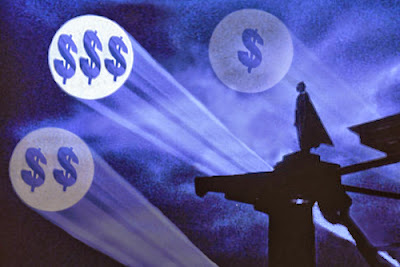Xerographica wrote:Mollary wrote:So basically you're saying the free rider problem is when demand outstrips supply? Because, that's just not what that is, who is getting a benefit without paying when there is a shortage of garden gnomes?
Here's a snippet from a recent post over at Crooked Timber...Thomas is here claiming that advertising is similar to political advocacy and action. Like the political activist or organizer who seeks to turn an unpopular, minority cause into a mass movement, the advertiser seeks to turn a niche product into a mass commodity.
In his Constitution of Liberty, Hayek makes a similar argument, claiming that throughout history, it has been the great men of money and property who have subsidized not only the development of mass commodities—turning previously expensive luxuries, which had been confined to the wealthy elite, into mass products and mass tastes—but also the cultivation of heterodox beliefs and minority persuasions. - Corey Robin, When Advertising is Action: Clarence Thomas Channels Hannah Arendt and Friedrich von Hayek
Right now the Facebook page that I created for the Epiphyte Society (ES) only has 300 likes. It's an "unpopular, minority cause". Would I like to see it turned into a "mass movement"? Of course. So the goal is to go from scarcity to abundance...
Scarcity -> Abundance
It should be pretty straightforward that the more money that's spent promoting/advertising the ES... the less time it will take to reach abundance. If each year each member of the ES spent a penny to promote the society... it would take a lot longer to reach abundance than if each year each member spent $1000 dollars to promote the society.
Would it still be the FREE rider problem if each member of the ES spent a penny a year to promote their society? Well, according to you, it would only be the free-rider problem if members of the ES didn't spend any money to promote their society. You're missing the point by a mile.
Just because it's called the FREE-rider problem really doesn't mean that it's only a problem when people pay absolutely nothing. It's a problem as long as the amount that people pay is less than their valuation. When people pay less than their valuation... it takes longer than it really should to go from scarcity to abundance.
Jumping back to the garden gnomes... if people paid less than their valuation... then it would take longer than it really should for there to be an abundance (optimal supply) of garden gnomes.
Were oranges always abundant? Nope, at one time they were scarce. It's the same thing with every fruit and vegetable. The only reason that any fruit/vegetable is abundant is because enough people were willing to pay enough money for the fruit/vegetable to become abundant. The issue is the time it takes to go from scarcity to abundance. How long did it take for oranges to go from scarce to abundant? It stands to reason that it would have taken less time if people had paid their valuation.
The free rider problem (allocation < valuation) is just as applicable to private goods as it is to public goods. With both types of goods... the innate drive that individuals have to maximize their benefit (biogine) can increase the time it takes to maximize society's benefit. What's beneficial for the individual in the short run is detrimental for society in the long run.
So you're saying, essentially, that when people less than what they are willing to pay for a good or service, that is a free rider problem? You're saying you want to eliminate the entirety of the consumer surplus with first degree price discrimination (where everyone pays the maximum they are willing to? I don't see that as at all possible, if people realize other people are purchasing a good or service at a significantly lower price, they'll purchase it off the person who buys it for less at a price above what the other person paid, but below what they paid.







